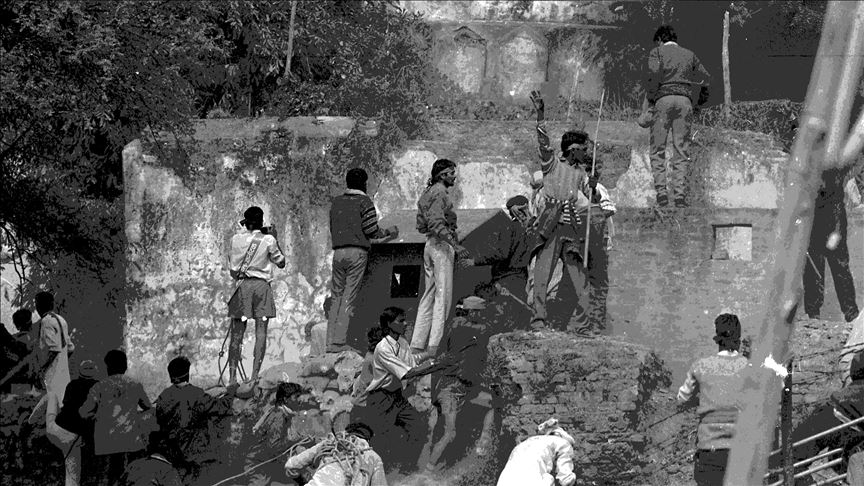Pakistan condemns construction at Babri Mosque site
Construction of Ram temple commenced Tuesday amid COVID-19 outbreak
 NEW DELHI, INDIA - (ARCHIVE): A file photo dated December 06, 1992 shows times of demolition of Babri Mosque in New Delhi, India. ( Praveen Jain - Anadolu Agency )
NEW DELHI, INDIA - (ARCHIVE): A file photo dated December 06, 1992 shows times of demolition of Babri Mosque in New Delhi, India. ( Praveen Jain - Anadolu Agency )
KARACHI, Pakistan
Pakistan on Wednesday condemned the commencement of construction of a Hindu temple at the site of the 16th century Babri Mosque in neighboring India following a controversial ruling by the Indian Supreme Court in November.
The government of India's Uttar Pradesh state announced the construction of the Ram temple at the site of the historic Babri Mosque which began Tuesday.
The development came at a time when the two nuclear-armed neighbors are struggling to contain the surging coronavirus pandemic.
"While the world is grappling with the unprecedented COVID-19 pandemic, the RSS-BJP combine in India is busy unabashedly advancing the ‘Hindutva’ agenda. The commencement of construction of a Mandir [temple] at the site of the historic Babri Masjid in Ayodhya on May 26 is another step in this direction and the government and people of Pakistan condemn it in the strongest terms," the Foreign Ministry said in a statement.
The commencement of the temple's construction, the statement said, was a sequel to the Indian top court's "controversial" decision, which completely failed to uphold the demands of justice.
The Babri Mosque was demolished by hardline Hindu mobs in 1992.
Then Prime Minister P.V. Narasimha Rao had pledged to rebuild the mosque in a televised address to the nation.
However, the Indian Supreme Court last November handed the site of the historic mosque to Hindus for the construction of a temple following a prolonged legal battle.
The court also ruled that a “suitable” 20,234-square-meter (five-acre) plot of land would be allotted to the Sunni Waqf Board either by the central government or provincial government to build a new mosque.
"The [Indian] Supreme Court’s verdict shredded the veneer of so-called secularism of India by making clear that the minorities are not safe in India and that they have to fear for their lives, beliefs and places of worship," the ministry said.
"The developments relating to the Babri Masjid (mosque), the discriminatory Citizenship Amendment Act (CAA), initiation of the National Register of Citizens (NRC) process, and the targeted killings of Muslims in Delhi in February 2020 are vivid illustrations of how Muslims in India are being marginalized, dispossessed, demonized and subjected to senseless violence,” it added.
The frequent mob lynchings by cow vigilantes and sinister schemes like "ghar wapsi" (back home), "love jihad" and "Corona jihad" are part of this mindset, it went on to say.
The right-wing “Hindutva” agenda, it charged, which appeared to have permeated the state institutions as well, is moving fast towards turning India into a “Hindu Rashtra [state].”
"As Pakistan has been sensitizing the world community, today’s India under the RSS-BJP sway is driven by the toxic mix of an extremist ideology and hegemonic ambitions. The result is a growing threat to the safety and well-being of minorities in India and to peace and security in the region and beyond," the ministry said.
The rising tide of religious bigotry in India, it opined, was well-documented by international human rights organizations, regularly highlighted by the international media and raised in a number of world parliaments.
"The international community must hold India to account for the continuous violations of human rights of minorities and urge the Indian government to take immediate steps to ensure that the rights of all minorities are fully protected and promoted as per India’s obligations under international instruments to which it is a party," it concluded.
Anadolu Agency website contains only a portion of the news stories offered to subscribers in the AA News Broadcasting System (HAS), and in summarized form. Please contact us for subscription options.







